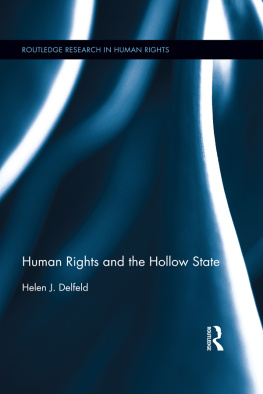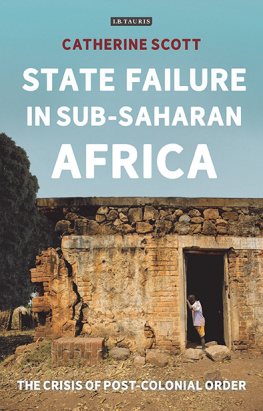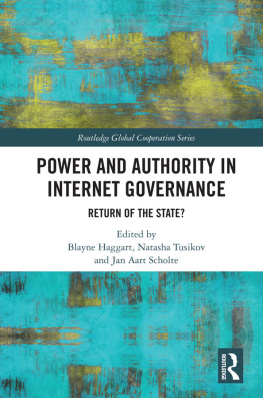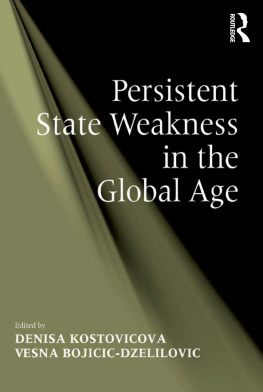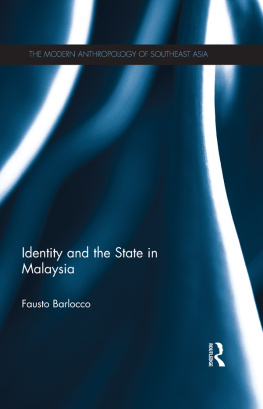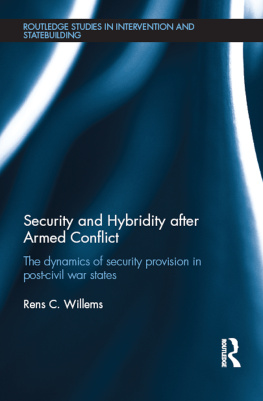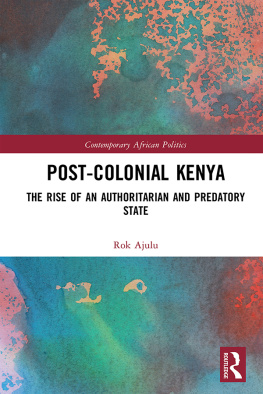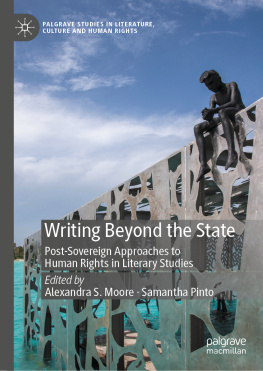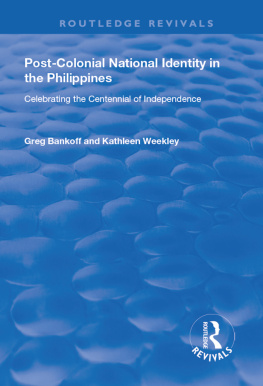Human Rights and the Hollow State
Helen Delfeld makes theoretical debates about failed states come alive by digging into the gritty political realities and complex perceptions of Filipinos coping with what she calls (accurately) the hollow state. This book makes us all smarter about popular movements, NGOs, elite corruption and how to actually study the state.
Cynthia Enloe, Clark University
Grounded in richly observed case studies from the Philippines, this book offers a lively and penetrating critique of the stubborn insistence that the state is peoples best available protection, or the natural and fundamental frame for governance, justice, development and peace. Delfeld provides a highly readable investigation of what people in the communities studied actually rely on to provide social order or to pursue basic needs or social change. Her account has significant implications for questions of human rights, development, state-building and peace-building and brings into stark relief the misguided nature of efforts to promote human rights that fail to take local approaches to governance and efforts to work against violence seriously.
M. Anne Brown, The University of Queensland
The book investigates the beliefs about governance that determine that state structures are the most appropriate venue for international human rights actors and activists to operate. Helen Delfeld argues that those beliefs rely on a normative perception of a nation-state, not necessarily applicable to most of the postcolonial world. While most postcolonial states may appear to demonstrate the trappings of modern nation-state-hood, these projects are mostly spurred by and benefit an elite class. At the same time, there may be little identification with their government among the grassroots polity.
Delfeld focuses on the Philippines as an example of a postcolonial state, using nested case studies to show how people think differently about the state at different scales. Following a two-pronged approach, she investigates key moments of state action or inaction, and then asks people at the grassroots about their perspectives on governance, their engagement with the state, and their views of human rights. Her findings indicate that people at the grassroots rely on alternative forms of governance, often in the form of NGOs, INGOs, local cooperatives, informal networks, or structures that pre-date both colonization and independence. Her research also indicates the possibility that some of the most effective human rights actors do not rely on the state, as demonstrated by comparing locally generated campaigns aimed at promoting environmental rights with state campaigns that address violence against women.
Human Rights and the Hollow State shows that rights initiatives misdirected through a hollow state might strengthen the mechanisms of the state, but might not actually create a more attentive nation-state. Human rights activists and actors may be far more effective by accessing local structures directly, the practical implications of which go beyond the Philippines to other postcolonial states.
Helen J. Delfeld is an Assistant Professor of Political Science at the College of Charleston.
Routledge Research in Human Rights
| 1 | Human Rights and US Foreign Policy
Jan Hancock |
| 2 | Human Rights and Foreign Aid
For Love or Money?
Bethany Barratt |
| 3 | Child Hunger and Human Rights
International Governance
Clair Apodaca |
| 4 | Sex Trafficking, Human Rights and Social Justice
Edited by Tiantian Zheng |
| 5 | Human Rights, Power and Civic Action
Comparative Analyses of Struggles for Rights in Developing Societies
Edited by Brd A. Andreassen and Gordon Crawford |
| 6 | Human Rights and the Hollow State
Helen J. Delfeld |
First published 2014
by Routledge
711 Third Avenue, New York, NY 10017
and by Routledge
2 Park Square, Milton Park, Abingdon, Oxon OX14 4RN
Routledge is an imprint of the Taylor & Francis Group, an informa business
2014 Taylor & Francis
The right of Helen J. Delfeld to be identified as author of this work has been asserted by her in accordance with sections 77 and 78 of the Copyright, Designs and Patents Act 1988.
All rights reserved. No part of this book may be reprinted or reproduced or utilized in any form or by any electronic, mechanical, or other means, now known or hereafter invented, including photocopying and recording, or in any information storage or retrieval system, without permission in writing from the publishers.
Trademark Notice: Product or corporate names may be trademarks or registered trademarks, and are used only for identification and explanation without intent to infringe.
Library of Congress Cataloging-in-Publication Data
Delfeld, Helen J., author.
Human rights and the hollow state / by Helen J. Delfeld.
pages cm. (Routledge research in human rights ; 6)
Includes bibliographical references and index.
1. Human rights. 2. Human rightsGovernment policy.
3. Failed states. 4. Non-governmental organizations. I. Title.
JC571.D35279 2014
323dc23
2013036628
ISBN: 978-0-415-70710-7 (hbk)
ISBN: 978-1-315-88702-9 (ebk)
Typeset in Sabon
by Apex CoVantage, LLC
Contents
As a Foucauldian, I am well-steeped in the idea that authorship is illusory one simply records the ideas available to one at the time. That makes me even more grateful for all the smart, engaged people who Ive been lucky enough to know, both before and during this writing, although that makes the standard mistakes being my own line a bit more nuanced, as well.
Growing up working class, Ive always had the perspective that things as told by elite political actorsespecially as told about working class people arent quite right. It took me quite a long time to realize I could actually talk about those things, which is one of the magical elements of social construction that makes thinking politically about non-elite actors so interestingas James Scott calls it, peasant studies.
First, I have to thank my sister, Maggie (Delfeld) Wentzell. Shes known me longest and believed in me against all evidence for much of that time. At times, thats been what convinced me to believe in myself, because I have to admit that she is pretty bright. Always my best friend. In no particular orderonly the order in which you occur to me. Audrey Devine-Eller, youre a trooper. All those millions of conversations about literally everything under the sun. Having someone there to do a reality check is invaluable. Nichole Shippen. What would I have done without my working-class sister-in-arms? I cant say what it has meant to go through this whole thing with youit certainly would have been a poorer experience with out you. Besides, you gave me $5 to thank you here. Kate Bedford, youre one of the first smart, original people who thought my ideas were smart and original too. I will always be grateful for your supportme on the road in to graduate school, you on the road out. I learned a lot about being a mentor from you. Hollis France, you didnt know it, but you were the best mentor a girl could ask for, with your nonchalant dismissal of authority, or any priority but those you set for yourself. Jen Wright, who shared much of my working-class perspective, and was always willing to fight about it. A special thanks goes to very good friends from graduate school, who uniquely created a culture with not a lick of competition, just constant support and encouragement. A number of you people were also brave enough to read early work, and you deserve a special acknowledgement. An idea emerging is often marked by muddiness, and the ideas presented here emerged from a black-tar pool. It took extreme optimism to see that there was anything at all valuable in the dross I was first producing. Benjamin Peters, Aaron Keck, Alexandra Filindra, Carolyn Craig, Sara Angevine, Joseph Dwyer, Giselle Datzyou are very special to me.

